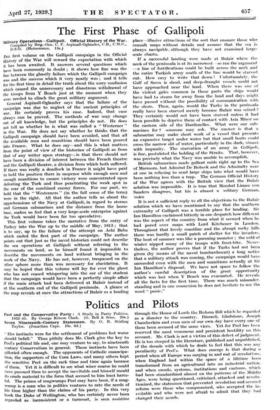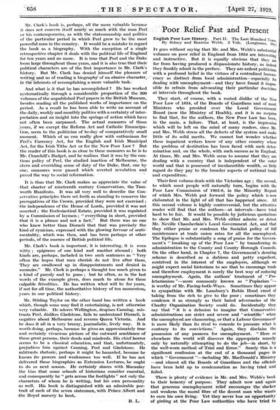Politics and Pilots
Peel and the Conservative Party : A Study in Party Polities, Jim instincts were for the settlement of problems lest worse should befall." Thus pithily does Mr. Clark give the key to Peel's political life and, one may venture to say, to nineteenth century Conservatism in general. Those instincts have been pilloried often enough. The opponents of Catholic emancipa- tion, the supporters of the Corn Laws, and many others kept the sensitive Peel on the rack time and time again because of them. Yet it is difficult to see what wiser course he could have pursued than to accept the inevitable and himself mould its crude material to the form that seemed to him least harm- ful. The prince of mugwumps Peel may have been; if a mug- wump is a man who in politics ventures to rate the needs of his time higher than the claims of his party.- In this very book the Duke of Wellington; who 'has certainly never been regarded as inconsistent or a turncoat, is seen assistine. through the House of Lords the Reform Bill which he.regarded as a disaster to the country. Disraeli, Gladstone, Joseph Chamberlain and even men of our own day have every one of them been accused of the same vices. Yet for Peel has been reserved the most venomous and persistent hostility on this account. Mr. Clark is not a victim of this defect of judgment. He is too steeped in the literature, published and unpublished, of the decade with which he deals to feel that this was any peculiarity of Peel's. What does emerge is that during a period when all Europe was surging in and out of revolutions. when England had within the space of a lifetime been transformed from an agricultural into an industrial nation, and when creeds, systems, institutions and customs, whielt had been standardized almost on the patterns of the Middle Ages, were being questioned, criticized, attacked and revolu- tionized, the statesmen that prevented revolution and secured reform were those who compromised, who accepted the in- evitable and who were not afraid to admit that they had changed their minds. Mr. Clark's book is, perhaps, all the more valuable because it does not concern itself nearly so much with the man Peel or his contemporaries, as with the statesmanship and politics of the particular period in which Peel grew to be the most powerful man in the country. It would be a mistake to regard the book as a biography. With the exception of a single retrospective chapter it deals with the political life of England for ten years and no more. It is true that Peel and the Duke loom large throughout those years, and it is also true that their political characters are of the first importance in Mr. Clark's history. But Mr. Clark has denied himself the pleasure of writing and us of reading a biography of an elusive character, in the interests of accomplishing ,a-more valuable task.
And what is it that he has accomplished ? He has worked systematically through a considerable proportion of the 300 volumes of the unpublished Peel papers in the British Museum, besides reading all the published works of importance on the period. As a result he has been able to write an account of the daily, weekly and monthly politics with a certainty of inter- pretation and an insight into the springs of action which have not often been surpassed. The actual measures of those years, if we except the Reform Act and Catholic Emancipa- tion, seem to the politician of to-day of comparatively small moment. Which of us can really glow with enthusiasm for Peel's Currency Act, for the English and Irish Municipal Act, for the Irish Tithe Act or for the New Poor Lasi ? But the reader of this book is as close to these measures as he is to Mr. Churchill's Budget, and he realizes that it was by the cau- tious policy of Peel, the studied inaction of Melbourne, the Stern and overriding sense of duty of the Duke, that, one by one, measures were passed which averted revolution and paVed the way to social reformation.
It is thus that Mr. Clark makes us appreciate the value of that charter of nineteenth century Conservatism, the Tam- worth Manifesto. It was all very .well to describe the Con- servative principles there set forth as standing to conserve the prerogatives of the Crown, provided they were not exercised ; the independence of the House of Lords, provided it was not asserted ; the Ecclesiastical Estate, provided it was regulated by a Commission of laymen ; " everything in short, provided that it is a phrase and not a fact." But there was no one who knew better than Disraeli that that was precisely the kind of cynicism, expressed with the glowing fervour of senti- mentality, which was then, and has been perhaps at other periods, of the essence of British political life. .
Mr. Clark's book is important, it is interesting, it is even witty ; epigrams of one kind and another abound ; both kinds are, perhaps, included in two such sentences as " Very often the hopes that men cherish do not live after them. They are swallowed up in disappointments and denied in memoirs." Mr. Clark is perhaps a thought too much given to a kind of parody and to puns ; but he often, as in the last words of the example given, does much to atone for these culpable frivolities. He has written what will be for years, if not for all time, the authoritative history of ten momentous years in our political history.
Mr. Stirling Taylor on the other hand has written a book which, though some may find it entertaining, is not otherwise very valuable. He adores Wellington, despises Canning, mis- trusts Peel, dislikes Gladstone, fails to understand Disraeli, is negative about Melbourne and reveres Queen Victoria. And he does it all in a very breezy, journalistic, lively way. 'It is worth doing, perhaps, because he gives an approximately true and certainly vivacious picture of the outward semblance of these great persons, their deeds and misdeeds. His chief horror seems to be a classical education, and that; unfortunately, prejudices him against Canning, Peel and Gladstone. He mistrusts rhetoric, perhaps it might be. hazarded, because he knows its powers and weaknesses too well. If he has not delivered these biographies •as Extension Lectures, he ought to do so next season. He certainly shares with Macaulay the bias that some schools of historians consider essential, and consequently he " gets across the footlights" not only the characters of whom- he is writing, but his own personality as well.. His book is distinguished with an admirable por- trait of each of the seven statesmen, with Prince Albert and (the Royal nursery to boot.
B. L.









































 Previous page
Previous page